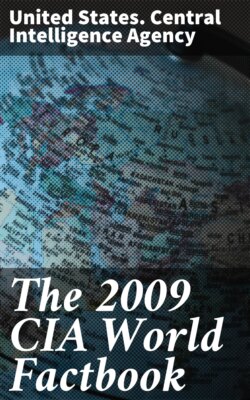Читать книгу The 2009 CIA World Factbook - United States. Central Intelligence Agency - Страница 67
На сайте Литреса книга снята с продажи.
34 37 N, 32 58 E
ОглавлениеMap references:
Europe
Area:
total: 123 sq km country comparison to the world: 223 note: includes a salt lake and wetlands
Area - comparative:
about 0.7 times the size of Washington, DC
Land boundaries:
total: 47.4 km
border countries: Cyprus 47.4 km
Coastline:
56.3 km
Climate:
temperate; Mediterranean with hot, dry summers and cool winters
Environment - current issues:
hunting around the salt lake; note - breeding place for loggerhead and green turtles; only remaining colony of griffon vultures is on the base
Geography - note:
British extraterritorial rights also extended to several small
off-post sites scattered across Cyprus; of the Sovereign Base Area
(SBA) land, 60% is privately owned and farmed, 20% is owned by the
Ministry of Defense, and 20% is SBA Crown land
People ::Akrotiri
Population:
approximately 15,700 live on the Sovereign Base Areas of Akrotiri and Dhekelia including 7,700 Cypriots, 3,600 Service and UK-based contract personnel, and 4,400 dependents country comparison to the world: 218
Languages:
English, Greek
Government ::Akrotiri
Country name:
conventional long form: Akrotiri Sovereign Base Area
conventional short form: Akrotiri
Dependency status:
a special form of UK overseas territory; administered by an administrator who is also the Commander, British Forces Cyprus
Capital:
name: Episkopi Cantonment (base administrative center for Akrotiri and Dhekelia)
geographic coordinates: 34 40 N, 32 51 E
time difference: UTC+2 (7 hours ahead of Washington, DC during Standard Time)
daylight saving time: +1hr, begins last Sunday in March; ends last Sunday in October
Constitution:
Sovereign Base Areas of Akrotiri and Dhekelia Order in Council 1960, effective 16 August 1960, functions as a basic legal document
Legal system:
the Sovereign Base Area Administration has its own court system to deal with civil and criminal matters; laws applicable to the Cypriot population are, as far as possible, the same as the laws of the Republic of Cyprus
Executive branch:
chief of state: Queen ELIZABETH II (since 6 February 1952)
head of government: Administrator Major General Jamie GORDON (since October 2008); note - reports to the British Ministry of Defense
elections: none; the monarch is hereditary; the administrator is appointed by the monarch
Diplomatic representation in the US:
none (overseas territory of the UK)
Diplomatic representation from the US:
none (overseas territory of the UK)
Flag description:
the flag of the UK is used
Economy ::Akrotiri
Economy - overview:
Economic activity is limited to providing services to the military and their families located in Akrotiri. All food and manufactured goods must be imported.
Exchange rates:
euros (EUR) per US dollar - 0.6827
note: on 1 January 2008 Akrotiri and Dhekelia adopted the euro along with the rest of Cyprus
Communications ::Akrotiri
Radio broadcast stations:
AM NA, FM 1, shortwave NA (British Forces Broadcasting Service (BFBS) provides Radio 1 and Radio 2 service to Akrotiri, Dhekelia, and Nicosia) (2006)
Television broadcast stations:
0 (British Forces Broadcasting Service (BFBS) provides multi-channel satellite service to Akrotiri, Dhekelia, and Nicosia) (2006)
Military ::Akrotiri
Military - note:
Akrotiri has a full RAF base, Headquarters for British Forces
Cyprus, and Episkopi Support Unit
page last updated on July 2, 2009
======================================================================
@Albania (Europe)
Introduction ::Albania
Background:
Albania declared its independence from the Ottoman Empire in 1912, but was conquered by Italy in 1939. Communist partisans took over the country in 1944. Albania allied itself first with the USSR (until 1960), and then with China (to 1978). In the early 1990s, Albania ended 46 years of xenophobic Communist rule and established a multiparty democracy. The transition has proven challenging as successive governments have tried to deal with high unemployment, widespread corruption, a dilapidated physical infrastructure, powerful organized crime networks, and combative political opponents. Albania has made progress in its democratic development since first holding multiparty elections in 1991, but deficiencies remain. International observers judged elections to be largely free and fair since the restoration of political stability following the collapse of pyramid schemes in 1997; however, there have been claims of electoral fraud in every one of Albania's post-communist elections. In the 2005 general elections, the Democratic Party and its allies won a decisive victory on pledges to reduce crime and corruption, promote economic growth, and decrease the size of government. The election, and particularly the orderly transition of power, was considered an important step forward. Albania joined NATO in April 2009 and is a potential candidate for EU accession. Although Albania's economy continues to grow, the country is still one of the poorest in Europe, hampered by a large informal economy and an inadequate energy and transportation infrastructure.
Geography ::Albania
Location:
Southeastern Europe, bordering the Adriatic Sea and Ionian Sea, between Greece in the south and Montenegro and Kosovo to the north
Geographic coordinates:
